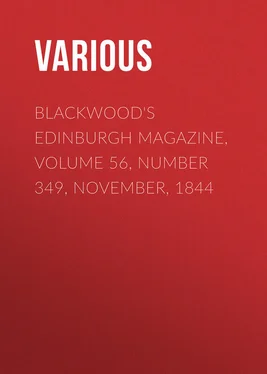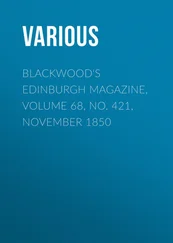Various - Blackwood's Edinburgh Magazine, Volume 56, Number 349, November, 1844
Здесь есть возможность читать онлайн «Various - Blackwood's Edinburgh Magazine, Volume 56, Number 349, November, 1844» — ознакомительный отрывок электронной книги совершенно бесплатно, а после прочтения отрывка купить полную версию. В некоторых случаях можно слушать аудио, скачать через торрент в формате fb2 и присутствует краткое содержание. Издательство: Иностранный паблик, Жанр: periodic, foreign_edu, Путешествия и география, на английском языке. Описание произведения, (предисловие) а так же отзывы посетителей доступны на портале библиотеки ЛибКат.
- Название:Blackwood's Edinburgh Magazine, Volume 56, Number 349, November, 1844
- Автор:
- Издательство:Иностранный паблик
- Жанр:
- Год:неизвестен
- ISBN:нет данных
- Рейтинг книги:4 / 5. Голосов: 1
-
Избранное:Добавить в избранное
- Отзывы:
-
Ваша оценка:
- 80
- 1
- 2
- 3
- 4
- 5
Blackwood's Edinburgh Magazine, Volume 56, Number 349, November, 1844: краткое содержание, описание и аннотация
Предлагаем к чтению аннотацию, описание, краткое содержание или предисловие (зависит от того, что написал сам автор книги «Blackwood's Edinburgh Magazine, Volume 56, Number 349, November, 1844»). Если вы не нашли необходимую информацию о книге — напишите в комментариях, мы постараемся отыскать её.
Blackwood's Edinburgh Magazine, Volume 56, Number 349, November, 1844 — читать онлайн ознакомительный отрывок
Ниже представлен текст книги, разбитый по страницам. Система сохранения места последней прочитанной страницы, позволяет с удобством читать онлайн бесплатно книгу «Blackwood's Edinburgh Magazine, Volume 56, Number 349, November, 1844», без необходимости каждый раз заново искать на чём Вы остановились. Поставьте закладку, и сможете в любой момент перейти на страницу, на которой закончили чтение.
Интервал:
Закладка:
We heard a considerable portion of the argument; and listened to this part of it with a comfortable consciousness that we beheld, in each counsel arguing it, as it were, a viper gnawing a file! If this be law, thought we, then have many thousands of injured gentlemen been, in all human probability, unjustly hanged, and transported for life or for years, been fined, imprisoned, sent to the tread-mill, and publicly whipped; for Heaven only knows how many of the counts in the indictments against – say Mr Fauntleroy; Messrs Thistlewood, Brunt, Tidd, and Ings; Messrs Greenacre, Courvoisier, and many others – have been defective in law! How many hundreds are now luxuriating in Norfolk Island who have, on this supposition, no just right to be there; and who, had they been but popular miscreants, might have collected sufficient funds from their friends and admirers to enable them to prove this – to try a fall with justice and show her weakness; to overhaul the proceedings against them, detect the latent flaws therein, return in triumph to the bosom of their families and friends, and exhibit new and greater feats of dexterity in their art and mystery! Why should not that " innocent " convict – now passing over the seas – Mr Barber, on hearing of this decision, soon after his arrival at the distant paradise to which he is bound, take new heart and remit instructions by the next homeward bound ship for a writ of error, in order that he may have his chance of detecting a flaw in one of the many counts of his indictment?
But, to be serious again, how stands the case in the present instance? Of eleven counts, six must be in legal contemplation expunged from the record: four, (the first, second, third, and fourth,) because, though in themselves sufficient in law, the findings upon them were technically defective; and two, (the sixth and seventh,) because they were technically defective in point of law, though the findings on them were unobjectionable.
Then there remain five perfect counts with five perfect findings, in the opinion of all the judges and of all the law lords; those five counts containing the gist of the whole charge against O'Connell and his confederates – those five findings establishing that the defendants were guilty of the offences so laid to their charge. Blot out, then, altogether from the record the six counts objectionable on the above-mentioned grounds, how are the other five to be got rid of? Thus, said the traversers' counsel. We have the entire record before us containing all the eleven counts and findings, both good and bad; and we find by the language of the record itself, that the judges, in passing sentence, took into consideration all the eleven counts , as if they had been valid counts with valid findings – for the judges expressly inflicted punishment on each of the traversers " for his offences aforesaid ." Is it not therefore plain to demonstration, that the measure of punishment was governed by reference to six — i. e. a majority – of eleven counts, which six counts had no more right to stand on the record, entailing liability to punishment on the parties named in them, than six of the odes of Horace? The punishment here, moreover, being discretionary, and consequently dependent upon, and influenced by, the ingredients of guilt, which it appears conclusively that the judges took into their consideration?
Such was the general drift of the reasonings of the traversers' counsel. What was their effect upon the assembled judges – those experienced and authoritative expositors of the law of the land? Why, after nearly two months' time taken to consider and ponder over the various points which had been started – after anxious consideration and communication one with another – they re-appeared in the House of Lords on the 2d of September; and, led by one who will be on all hands admitted to be one of the most experienced, gifted, profoundly learned, and perfectly impartial and independent lawyers that ever presided over a court of justice – Sir Nicholas Tindal – seven out of nine of the judges expressed a clear unhesitating opinion, that the third and eleventh questions should be answered in the negative – viz. that the judgment was in no way invalidated – could be in no way impeached, by reason of the defective counts and findings. The two dissenting judges who had been hit by the arguments of the traversers' counsel, were Baron Parke and Mr Justice Coltman – the latter speaking in a confident, the former in a remarkably hesitating and doubting tone. The majority consisted of Chief-Justice Sir Nicholas Tindal, Mr Justice Patteson, Mr Justice Maule, Mr Justice Williams, Mr Baron Gurney, Mr Baron Alderson, and Mr Justice Coleridge.
We have no hesitation in expressing our opinion, that the judgments delivered by this majority of the judges stand on the immovable basis of sound logic, accurate law, and good sense; and lament that our space will not allow us to present our readers with the many striking and conclusive reasonings and illustrations with which those judgments abound. We can but glance at the result – leaving the process to be examined at leisure by those so disposed. The artful fallacies of the traversers' counsel will be found utterly demolished. The first grand conclusion of the judges was thus expressed by the Chief-Justice —
"I conceive it to be the law, that in the case of an indictment, if there be one good count in an indictment upon which the defendants have been declared guilty by proper findings on the record, and a judgment given for the crown, imposing a sentence authorized by law to be awarded in respect of the particular offence, that such judgment cannot be reversed by a writ of error, by reason of one or more of the counts in the indictment being bad in point of law."
The main argument of the traversers' counsel was thus disposed of —
"It was urged at your lordships' bar, that all the instances which have been brought forward in support of the proposition, that one good count will support a general judgment upon an indictment in which there are also bad counts, are cases in which there was a motion in arrest of judgment , not cases where a writ of error has been brought. This may be true; for so far as can be ascertained, there is no single instance in which a writ of error has been ever brought to reverse a judgment upon an indictment, upon this ground of objection. But the very circumstance of the refusal by the court to arrest the judgment, where such arrest has been prayed on the ground of some defective count appearing on the record, and the assigning by the court as the reason for such refusal, that there was one good count upon which the judgment might be entered up, affords the strongest argument, that they thought the judgment, when entered up , was irreversible upon a writ of error. For such answer could not otherwise have been given; it could have had no other effect than to mislead the prosecutor, if the court were sensible at the time, that the judgment, when entered up, might afterwards be reversed by a court of error."
The grand argument derived from the language of the judgment , was thus encountered: —
"I interpret the words, 'that the defendant for his offences aforesaid, be fined and imprisoned,' in their plain literal sense, to mean such offences as are set out in the counts of the indictment which are free from objection, and of which the defendant is shown by proper findings on the record to have been guilty – that is in effect the offences contained in the fifth and eighth, and all the subsequent counts. And I see no objection to the word offences, in the plural, being used, whether the several counts last enumerated do intend several and distinct offences, or only one offence described in different manners in those counts. For whilst the record remains in that shape, and unreversed, there can be no objection in point of law, that they should be called 'offences' as they appear on the record."
Читать дальшеИнтервал:
Закладка:
Похожие книги на «Blackwood's Edinburgh Magazine, Volume 56, Number 349, November, 1844»
Представляем Вашему вниманию похожие книги на «Blackwood's Edinburgh Magazine, Volume 56, Number 349, November, 1844» списком для выбора. Мы отобрали схожую по названию и смыслу литературу в надежде предоставить читателям больше вариантов отыскать новые, интересные, ещё непрочитанные произведения.
Обсуждение, отзывы о книге «Blackwood's Edinburgh Magazine, Volume 56, Number 349, November, 1844» и просто собственные мнения читателей. Оставьте ваши комментарии, напишите, что Вы думаете о произведении, его смысле или главных героях. Укажите что конкретно понравилось, а что нет, и почему Вы так считаете.












